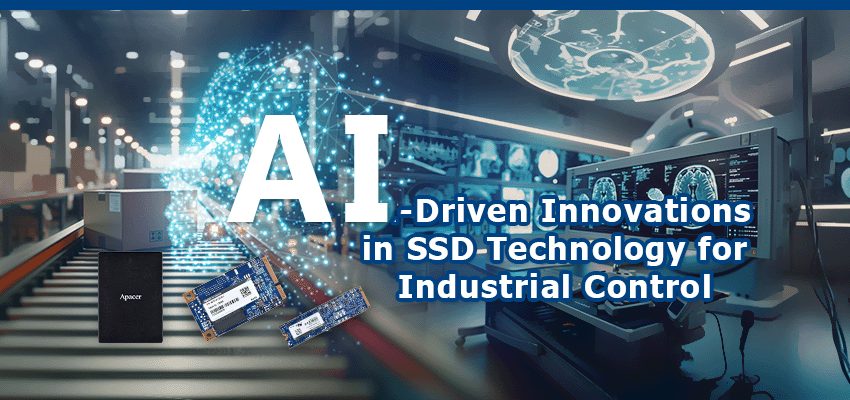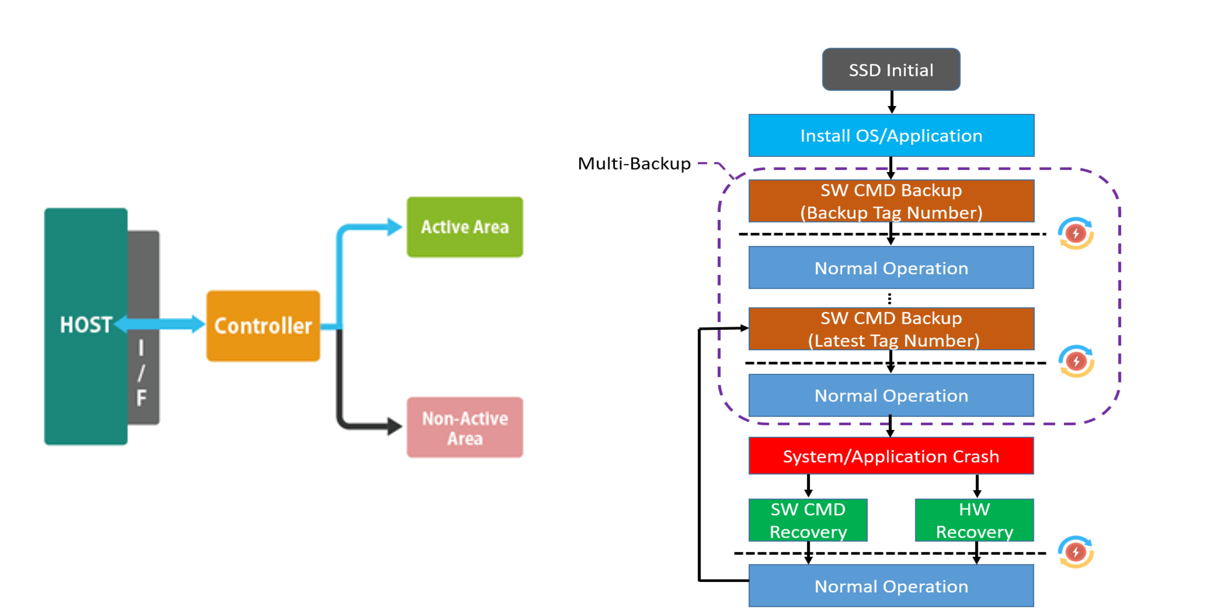AI-Driven Innovations SSD Technology for Industrial Control
1/08/2024

The Application of AI in SSDs
In today’s data-driven world, the increasing demand for AI and industrial control applications has raised the requirements for the reliability, durability, and high performance of storage solutions. Consequently, it’s no surprise that groundbreaking SSDs and controllers are incorporating AI to enhance the performance of either the SSD itself or the systems hosting it.
Main Usage #1: Managing NAND
AI can manage hot and cold data on different types of flash memory chips. This application of AI is already a process executed by many SSDs. SSDs often configure NAND blocks as single-level cell (SLC) flash, which is faster than triple-level cell (TLC) or quad-level cell (QLC) flash but several times more expensive. Hot data is stored in SLC blocks, while cold data is moved to TLC or QLC.
SSD controllers can integrate AI into the management of hot and cold data. After a brief training period, the SSD adapts to the workload and manages the placement of hot and cold data.
Main Usage #2: In-place Data Preprocessing
The internal AI capabilities of SSD controllers can generate labels on large unstructured datasets, a form of preprocessing useful for visual processing, video analysis, and text processing. Samsung, in collaboration with Xilinx (AMD), previously developed AI SSDs that combined storage space with FPGA-based compute accelerator functions. Their proof of concept initially combined Samsung SSDs and Xilinx (AMD) FPGAs on a PCIe add-in card. This has now evolved into a 4TB U.2 device that has completed customer certification and is fully available on the market. Through this AI integration, Samsung’s demonstration aimed to show how AI tasks could be offloaded into SSDs. Both the FPGA and SSD appear as separate PCIe endpoints in the host system, reducing the load on the host processor. This also accelerates search speeds, such as instructing the SSD to find all documents containing a specified string. Traditionally, this is a CPU and I/O-intensive task. Optimizing access at the device level can significantly reduce RAM usage while lowering the CPU cost and computing power needed for the same operation, bringing substantial benefits to the performance of databases and search engines.
Advantech and Apacer's CoreSnapshot Backup Technology
Advantech and Apacer have collaborated to launch SSD solutions suitable for industrial control and AI applications, featuring CoreSnapshot Backup Technology managed by built-in AI intelligence.
Key Advantages
- Fast Backup and Recovery: Featuring built-in AI intelligent management, the system can be restored in one second via remote control or local operation in the event of data corruption or boot failures. This eliminates the need to wait for maintenance personnel and significantly shortens system recovery time.
- Increased System Reliability: CoreSnapshot Backup Technology quickly restores the system to normal operating status when a failure occurs.
- Reduced Maintenance Costs: The ability to quickly recover remotely or locally reduces reliance on maintenance personnel, lowering on-site maintenance costs and human resource expenditure.
- Simplified Management: Built-in AI intelligent management automatically performs backup and recovery operations, simplifying system management and maintenance processes, allowing managers to focus more on core business activities.
Applicable fields
- Medical Devices
During a CT scan, a large amount of high-resolution image data must be processed and stored in real time. SSDs offer low latency and high performance, allowing for quick storage and retrieval of this data, ensuring doctors can promptly access diagnostic information. Smart medical devices also use SSDs in patient data management systems, electronic medical records (EMR) systems, and medical image storage systems, which have extremely high requirements for data security and reliability. Additionally, these devices often need to operate continuously for extended periods. The hot-swappable nature of SSDs ensures system stability under high-load operations, reducing maintenance and replacement frequency.
- Logistics and Warehouse Management Systems
In a large warehouse center, thousands of goods are moved in and out daily, utilizing vast amounts of small data from various sensors, barcode scanners, and RFID readers. Product information needs to be recorded and updated in real-time to optimize inventory management, track the location of goods, and improve operational efficiency. The high durability and stability of SSDs allow them to withstand frequent data read and write operations, ensuring data accuracy and integrity. Their low latency and high IOPS performance characteristics ensure that the system can quickly process large amounts of data, supporting real-time inventory updates and goods tracking.
These features make the CoreSnapshot Backup Technology SSD solution by Advantech and Apacer an indispensable technology for industrial control and AI applications, effectively improving system availability and operational efficiency. For various application needs, different versions of CoreSnapshot Backup Technology are available. Please contact your local IS&D personnel to learn more.

